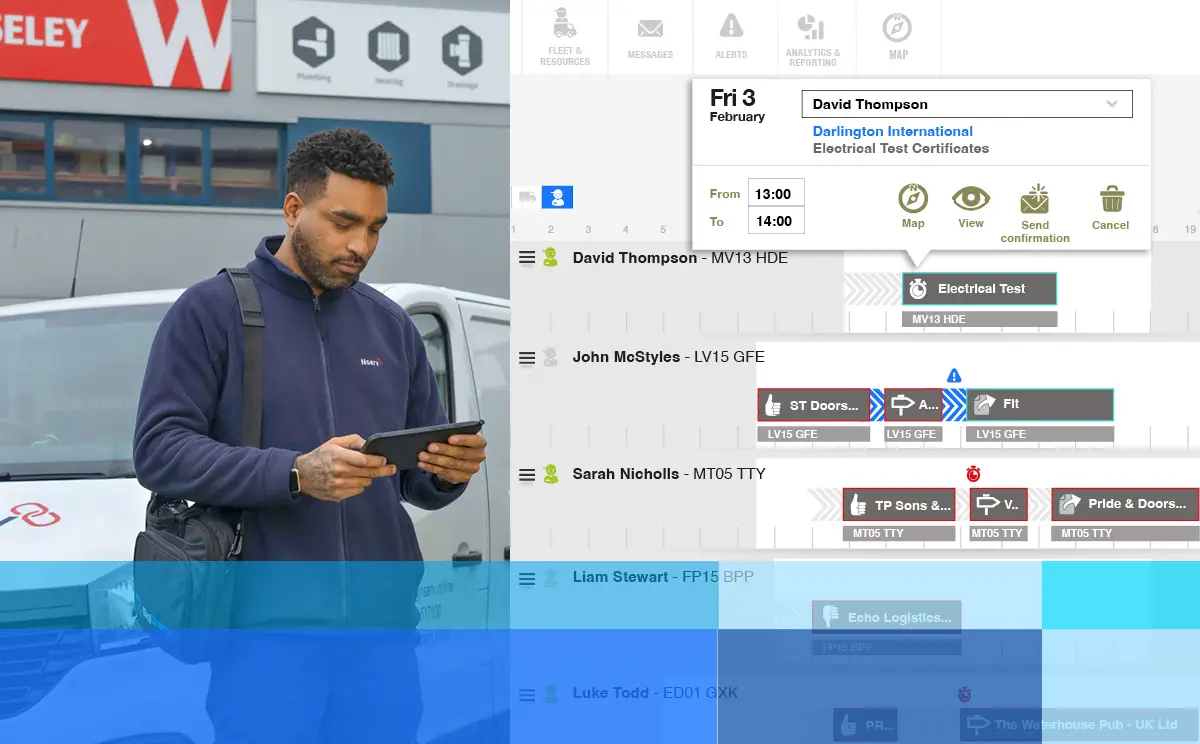
Top 10 Electrical Contractor Software to Power Up Your Business
The right software is like having a high-powered tool belt that helps you manage jobs, handle scheduling, and oversee your entire operation, from quote to invoice. With technology advancing at breakneck speed, staying updated with the best electrical contractor software can keep your business current and competitive.
This blog post takes a look at the top 10 electrical contractor software solutions that have been designed to streamline the operations of electricians, electrical business owners, and CEOs alike. Whether you’re just starting or looking to upgrade, these tools can drive efficiency, accuracy, and growth in your company.
—
1. SimPRO
SimPRO is a robust field service management software that offers comprehensive features such as job scheduling, invoicing, reporting, and inventory management. Its project management capabilities are particularly useful for electrical contractors who handle complex, multi-stage projects.
Key Features:
- Seamless job scheduling and dispatch
- Detailed project management tools
- Integrated invoicing and payment processing
2. ServiceTitan
ServiceTitan is designed for a range of home service professionals, including electricians. This all-in-one solution provides real-time dispatch, useful mobile apps for field workers, customer relationship management (CRM), and multi-channel customer communication.
Key Features:
- Customer service call booking
- Dynamic reporting and analytics
- Comprehensive mobile app for field service management
3. Housecall Pro
Popular among small to medium-sized businesses, Housecall Pro simplifies the management of daily operations. The platform includes features such as online booking, automatic invoicing, and GPS tracking for team members.
Key Features:
- User-friendly booking and dispatch interface
- Automated invoices and follow-up marketing
- Live GPS tracking for on-the-road teams
4. Jobber
Jobber stands out for its ease of use and customer-centric tools. It caters to various handyman services, including electrical contracting, where it’s praised for its streamlined scheduling, CRM, and on-the-spot invoicing.
Key Features:
- Organized scheduling and job tracking
- Smooth invoicing with customizable templates
- Client hub for a superior customer experience
5. Electric Ease
Electric Ease is tailored specifically for electrical contractors, focusing on estimating, job costing, and project management. This software is scaled for small to large businesses aiming to optimize workflow and enhance their profitability.
Key Features:
- Accurate job estimating and costing
- In-depth project management tools
- Accessible via desktop and mobile platforms
6. Esticom
Esticom merges cloud-based estimating and takeoff tools with job management features, making it a valuable choice for contractors who prioritize accuracy in their bids and desire a streamlined workflow from start to finish.
Key Features:
- Auto-count takeoff feature for materials
- Cloud-based collaborative platform
- Simplified job management system
7. FieldEdge
FieldEdge combines daily operations with customer history records, allowing contractors to manage both the service side and customer relationships efficiently. Its guiding principle is to connect the office to the field seamlessly.
Key Features:
- Advanced dispatch board
- Real-time dashboard metrics
- Integration with QuickBooks for accounting
8. ConEst IntelliBid
IntelliBid is a software solution devoted to the estimating process, providing electrical contractors with the tools needed to submit accurate, timely, and competitive bids.
Key Features:
- Detailed estimating with a comprehensive database
- Bid management and quote analysis
- Labor and material costing
9. Accubid Electrical Estimating
Accubid is a full-featured estimating program designed specifically for electrical and industrial mechanical contractors. It delivers a precise takeoff and estimating process geared for complex and large-scale projects.
Key Features:
- Precise takeoff modules
- Flexible databases adaptable to various job sizes
- Bidirectional integration with CAD applications
10. QuickBooks Enterprise
While not exclusively for electricians, QuickBooks Enterprise is an excellent option for financial management. It’s harnessed by businesses of all types for its top-notch accounting and bookkeeping capacities, paired with project cost tracking features.
Key Features:
- Robust accounting features and integrations
- Advanced inventory tracking
- Customizable reports for financial insights
Final Thoughts
In the current digital age, the proper electrical contractor software is indispensable. The efficiency and efficacy of your operations hinge on your ability to leverage technology that fits your business needs. This collection of the top 10 is designed to serve a broad spectrum of demands, whether it’s job tracking, financial management, estimating or scheduling.
The importance of adopting the proper tools cannot be understated. Having the right software can mean the difference between a well-oiled electrical business and one struggling to keep up. As you evaluate these options, consider your specific workflow, the size of your operations, and the unique challenges you face.
For CEOs and electrical business owners aiming to ensure their company’s competitiveness and growth, the journey toward digital transformation is well worth the investment. Remember, the best software is the one that is not only powerful but also aligns perfectly with the way your team works.
Don’t get left in the dark; power up your electrical contracting business with a surge of efficiency by choosing the right software today!
If you’re ready to take the next steps in selecting your ideal electrical contractor software, begin with a comprehensive needs assessment. Gather input from your team members who will be using the software daily. Evaluate the current pain points in your processes, such as gaps in job scheduling, the complexity of project management, or any bottlenecks in accounting and reporting. Remember to also consider scalability for future growth, customer support offered by the software vendor, and integration with existing systems. By prioritizing these elements, you can narrow down your options to the ones that best match your requirements, setting your business up for a more streamlined, productive future.